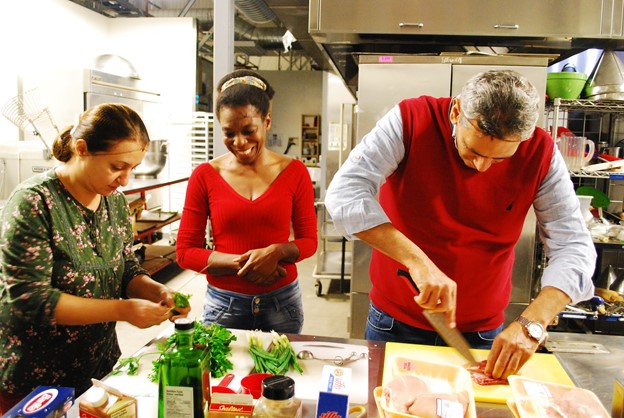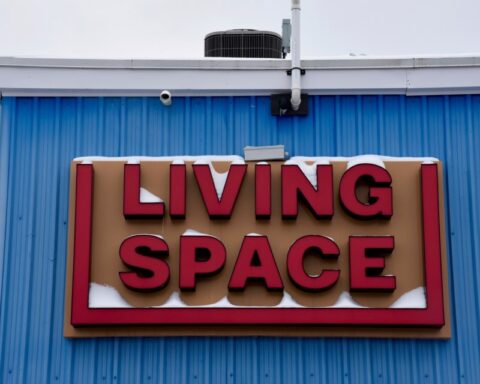The COVID-19 pandemic is disrupting the work of the non-profit food justice organization FoodShare, which works with Black, Indigenous, people of colour (BIPOC), and immigrant communities struggling with food insecurity. Funding cuts and COVID-related restrictions have forced several of FoodShare’s programs to shut down even as demand for all kinds of food support is growing.
Since the start of the pandemic, many Black, Indigenous, and people of colour (BIPOC) have been struggling to make ends meet due to job losses and shorter work hours. The Toronto Fallout Report documents this disproportionate impact of COVID-19 on marginalized populations in the Toronto census metropolitan area. While people who make more than $36.07 an hour saw their total work hours increase by 21 per cent in August 2020 versus February 2020, workers who make less than $17.48 per hour—most of whom are BIPOC—saw their hours reduced by 30 per cent. As a result, many have heavily relied on food justice organizations such as FoodShare for help.
Toronto’s FoodShare collaborates with local communities in sustaining and creating food initiatives driven by education, advocacy and support. They strive to build a food system where everyone has equal access to affordable and fresh foods.
But funding cuts caused by COVID-19 have affected efforts such as Community Food Programs, says Jade Guthrie, Community Food Programs’ coordinator at FoodShare.
“I can’t speak generally about the rest of the other departments in FoodShare, but our Community Food Programs have definitely been impacted,” she said. “It’s been a challenge figuring out funding for the year because a lot of funders have been changing the way they give out money,”
Instead of allocating equal sums of money to community food programs and emergency food provisions, donors have been shifting funds to the latter in response to a spike in demand for immediate food access. According to Hunger Report 2020 by Feed Ontario, 537,575 individuals visited a food bank in Ontario between April 1, 2019 and March 31, 2020, which is a 5.3 per cent increase over the previous year, and a 7.8 per cent increase over a two-year period.
Food banks are great short-term solutions for those who are in dire need of food and nutrition; however, with COVID-19, long-term arrangements are needed and required for those severely struggling.
As such, FoodShare’s Community Food Programs focus on education and knowledge exchange around hard and soft food skills such as cooking, canning, learning how to preserve foods, and on conversations around food justice and the food system. These types of programs differ from emergency food provisions, bringing people together around food to build community and discuss inequities in the food system.
Food insecurity affects newcomers more
“Since COVID, we’ve had to do everything online,” says Guthrie. “Unfortunately, some of our programs don’t work, while some do. One of the programs we used to run in person, called ‘Cooking Up Community,’ was specifically geared towards folks who are living in transitional housing or experiencing homelessness.”
“So, we did the program with a group of folks who were refugees and asylum seekers in a transitional housing setting. As a result of the pandemic, we haven’t been able to continue that kind of work just because of the barriers to accessing technology in some shelters.”
Newcomers such as refugees and asylum seekers are even more marginalized coming into the system, so not having access to necessities like technology puts them in an even more vulnerable position in society. It denies low-income newcomers the help they need.
In order to demand food justice, food equity must come first. For FoodShare, their mission is to work toward food security through equitable means—like removing systemic barriers faced by BIPOC Torontonians and immigrants in accessing kitchens, community gardens, education, and sustainable and nutritious foods.
Despite cuts in funding for some of their programming, FoodShare continues to offer other programs such as “Good Food Box,” where they deliver boxes of locally grown and culturally diverse produce to families. Every Good Food Box purchased helps maintain FoodShare’s diverse programs and other initiatives, so that Toronto’s most nutritionally vulnerable are thoroughly supported during tough times.
Without proper funding for organizations like FoodShare, low-income families, specifically those who are newcomers and BIPOC, won’t have the proper resources and aid they need in order to not only survive in Toronto but also strive in an economy where the odds are stacked against them.
Read also: “How a Brampton Non-Profit Battles Rising Food Insecurity”
Angelica Babiera is an NCM journalist and content creator. She graduated with Honours from York University's English and Professional Writing program, specializing in Journalism. She's written for publications such as Holr Magazine, Excalibur Newspaper, and Unwritten. She is skilled in digital art using Adobe's Photoshop and Illustrator, editorial photography and makes educational IGTV videos.






Food should be accessible to all. If Canada is hard pressed with food shortages, then we can imagine how it is in Africa or Bangladesh and other dense populations.